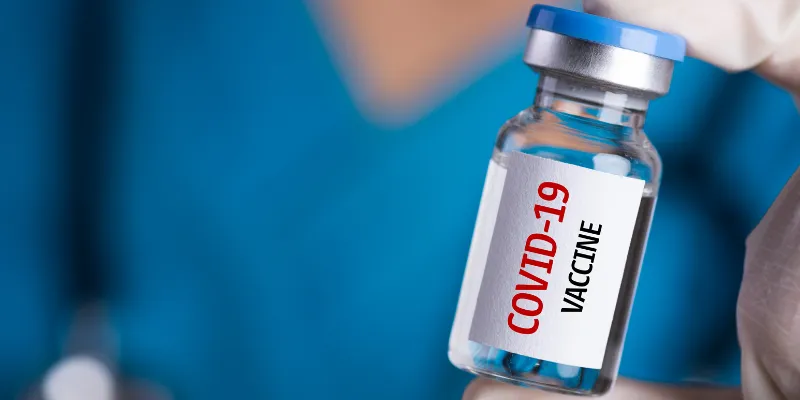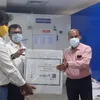National Vaccination Day: How SAMRIDH is helping scale COVID-19 healthcare initiatives in semi-urban, rural India
As India nears the 200 crore vaccination mark (in terms of doses given), we look at how SAMRIDH, a financing facility, by the USAID and Atal Innovation Mission by NITI Aayog, implemented by IPE Global, has been helping support rural healthcare projects geared towards COVID-19 care.
“It felt like a glimmer of hope at the end of a long, dark tunnel,” says a disembodied voice on the television as the camera pans to a long shot of dishevelled hospital beds, bodies still on them. Whether they’re alive or dead is only reflected in the reaction of those crowding the beds — some are holding their heads and crying, while others have their eyes glued to the respiratory monitors.
The camera refocuses on the doctor who has been telling an Indian English news channel her experience leading the COVID-19 ward during the height of the second wave.
“Vaccines are the only difference between a sick person and a dead person, so please get vaccinated,” she pleads.
A year on, the world looks slightly different than it did during the Delta variant wave. Things are not as bad, yet, and that’s thanks largely to the efforts of the hundreds of healthcare workers, scientists, logistics operators, COVID-19 warriors, and government agencies that stepped up and went beyond their call of duty to ensure COVID-19 vaccines were available in the remotest corners of India.
It’s also thanks to the efforts of those who worked from behind the lines to pull off a feat as mammoth as enabling the vaccination of 100 crore-plus people — and that list includes ventures like Pluss Advanced Technologies and , among countless others, which have enabled safe deliveries of vaccines at the right temperature, and reduced vaccine wastage.
Udit Mangal, Vice President of Business Development at Pluss Advanced Technologies, recalls how before the vaccines hit the markets, there was a scramble for cold-chain logistics solutions, as well as cold-storage products — such as ice-boxes — that could maintain the optimum temperature of the vaccine vials.
"India is a hot country, and sadly at the time, we didn’t have the right technology for maintaining the appropriate temperature for the vaccine vials. Common vaccines in India can be stored and transported at room temperature without any problem, but the COVID-19 vaccines were a different ballgame," he tells YourStory.

Pluss decided to work towards creating a product that could help transport vaccine vials safely, even over longer distances, and came up with Celsure — temperature-controlled shipping containers that use Phase Change Materials (PCMs) to maintain precise temperatures without any external power supply for up to five days.
But while its tech and product were sound, well-received and much-needed at the time, the company found itself having to manufacture in a month what it had the capacity to do in a year.
SAMRIDH — Sustainable Access to Markets and Resources for Innovative Delivery of Healthcare — stepped in to provide Pluss with the funds it needed to scale its manufacturing. The company went from manufacturing 3,000 boxes per month, to 6,000, as well as established local warehouses and freezing facilities in Hyderabad, Telangana.
Dedicated to healthcare in lower-tier India
SAMRIDH is a financing facility implemented by IPE Global, an international consulting firm that provides technical assistance and solutions for development and sustainable growth in developing countries. It derives its primary funding from the United States Agency for International Development (USAID), as well as a host of debt funding players.
The facility was established in 2020, and has deployed $12 million in blended-finance funding, so far.
Capital for the fund has come largely from philanthropic organisations such as USAID, Rockefeller Foundation, and Crypto Relief, Ritika Pandey, Associate Director, health, nutrition, water, sanitation and hygiene (WASH) at IPE Global, told YourStory in a conversation.
USAID has put in around $20-$21 million, philanthropic grants make up around $25-$29 million, and the remaining is debt commitments.
SAMRIDH either provides direct capital infusion, or, at times, puts up guarantees, co-signs a loan with startups and ventures looking to raise debt capital, or even helps them pay off interests on loans. It mainly funds healthcare companies and infrastructure projects in Tier II and lower cities, which are focused on COVID-19.

So far, the organisation has evaluated 200 different ventures, businesses, projects and initiatives across India, of which it has funded and supported 21 different projects around COVID-19 care. Its investments typically fall into five categories:
- Oxygen supply, where two companies — Collateral Medical and Spantech Engineers have raised funding.
- Health infrastructure, where B2B industrial ecommerce startup received funding for the distribution of its rural COVID-19 homecare kits, as well as providing PPE kits to on-ground NGOs and frontline ASHA, ANM workers. Hindustan Latex Family Planning Promotion Trust raised funding from SAMRIDH for their work with ambulances and ambulance drivers, which enabled it to expand its reach to 134 districts. Other institutions that raised funding as part of this category include Saral Designs, Datta Meghe Institute of Medical Sciences, Karma Primary Healthcare, Centre for Health and Development Group, Sevamob Ventures, GNRC, and PrimedeQ.
- Medical devices, under which companies like , , Aerobiosys Innovations (which manufactures portable ICU ventilators), and Cardiac Design Labs raised funding.
- Training and capacity building of health workers
- Vaccine distribution and supply chain management, under which Pluss, AWL India and Blackfrog got funded.
Going forward, SAMRIDH plans to look at funding and supporting more healthcare projects which have a COVID-19 angle. It also plans to use the available funds to plug the gaps prevalent in non-urban/metro healthcare infrastructure. The organisation is also keen to fund women-led initiatives.
Edited by Kanishk Singh









